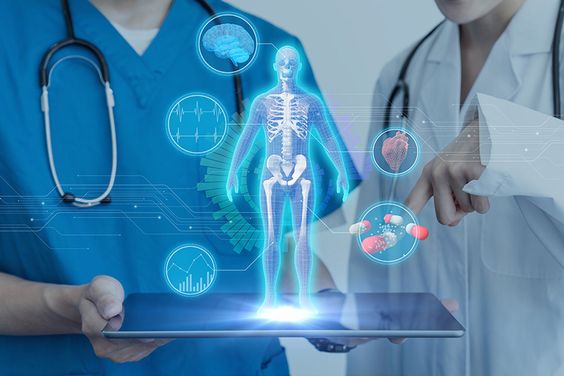AI and Healthcare
featured
AI is changing the game in healthcare, from diagnostics to personalized treatment and patient care. It's a powerful tool that enhances disease diagnosis, offering more accuracy, reducing errors, and speeding up the process. For instance, AI can assist in identifying diseases like breast cancer and skin cancer, even outperforming human experts. It can also help in optimizing drug dosages, reducing side effects, and enhancing the effectiveness of treatments. Furthermore, AI plays a crucial role in population health management, predicting disease outbreaks and identifying high-risk patients, ultimately saving costs and improving patient outcomes.

But the impact of AI doesn't stop there; it's transforming patient care too. Virtual health assistants and mental health support systems offer personalized care and improve patient engagement. AI chatbots help patients with medical advice, appointment scheduling, and even monitoring vital signs, making healthcare more accessible. Additionally, AI can enhance patient education by providing tailored information and guidance, empowering patients to take control of their health. The future of healthcare is being shaped by AI, promising better accuracy, efficiency, and patient-centered care. However, challenges like data accuracy, privacy, and maintaining a human touch must be addressed as AI continues to evolve and revolutionize the healthcare industry.
The implications of Human-Chatbot interaction
Definition of chatbotsGrowing use of chatbots in various domainsHuman-Chatbot InteractionsTypes of interactions (spoken, written, visual)Benefits of human-like interactionsPsychological Impacts of ChatbotsEmotional support and companionshipReduction of social isolation and lonelinessCognitive and behavioral changesEthical ConsiderationsThe potential for dependence and over-reliance on chatbotsPrivacy and data security concernsFuture TrendsAdvancements in natural language processing and artificial intelligenceIntegration of chatbots into mental health treatment plansLegal ConcernsEnsuring ethical use of chatbots in mental healthProtecting user privacy and data
Pros and Cons of AI-Generated Music
IntroductionThe transformative impact of artificial intelligence (AI) on the music industry.AI used recently to create the last Beatles songAdvantages of AI MusicDemocratization of music production, making it accessible to all.Quick and efficient music generation, eliminating copyright issues.Personalized compositions based on individual preferences.Concerns and ChallengesPotential impact on human artists and unique artistic expression.Complex legal questions regarding copyright ownership.AI's limited understanding of cultural context and emotional nuances.The Harmonious CoexistenceStriving for a balance where AI enhances the music industry rather than undermines it.AI as a tool to streamline the creative process for artists.Personalized listening experiences based on user preferences.

